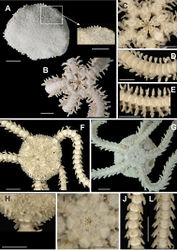Ophiophragmus brachyactis
| Notice: | This page is derived from the original publication listed below, whose author(s) should always be credited. Further contributors may edit and improve the content of this page and, consequently, need to be credited as well (see page history). Any assessment of factual correctness requires a careful review of the original article as well as of subsequent contributions.
If you are uncertain whether your planned contribution is correct or not, we suggest that you use the associated discussion page instead of editing the page directly. This page should be cited as follows (rationale):
Citation formats to copy and paste
BibTeX: @article{Gondim2013ZooKeys307, RIS/ Endnote: TY - JOUR Wikipedia/ Citizendium: <ref name="Gondim2013ZooKeys307">{{Citation See also the citation download page at the journal. |
Ordo: Ophiurida
Familia: Amphiuridae
Genus: Ophiophragmus
Name
Ophiophragmus brachyactis H.L. Clark, 1915 – Wikispecies link – Pensoft Profile
Description
Disk circular (dd = 4.45 mm). Covered by imbricating scales of irregular shape (Fig. 7a). Margin of interradial field with 12-13 small, enlarged, blunt spines that decrease in size in the direction of the radial shields (Fig. 7a). Radial shields slightly longer than wide, united, except at proximal end, where a small triangular scale occurs between the pair of radial shields. Ventral interradius covered by scales similar to dorsal scales (Fig. 7b). Oral shields arrow-shaped (Fig. 7c). Adoral shields enlarged laterally, contiguous in proximal region. Two papillae on each side of jaw angle, the distal one longer and wider (Fig. 7c). Infradental papillae robust, and rectangular. Dorsal arm plate wider than long, rectangular, with rounded borders (Fig. 7d). Ventral arm plate pentagonal, with small notch on distal margin (Fig. 7e). Two small, perpendicular, tentacle scales, inner scale slightly longer than outer scale. Three small, compressed, blunt, arm spines, the ventral one largest (Fig. 7e).
Distribution
Florida and Dry Tortugas, the Antilles, Gulf of Mexico, and Brazil (Thomas 1962[1], Hendler et al. 1995[2]). In Brazil from Paraíba (Gondim et al. 2008[3]), Espírito Santo, and Rio de Janeiro (Manso 1988[4], 1993[5]). Depth 22 to 87 m. Recorded from 30 m in this study.
Remarks
Species known from bottoms with sand, in which bryozoans predominate (Manso 1988[4]). We consider Amphiodia riisei distinct from Ophiophragmus brachyactis and use the name Amphiodia riisei for the former taxon (see discussion under this species).
Taxon Treatment
- Gondim, A; Alonso, C; Dias, T; Manso, C; Christoffersen, M; 2013: A taxonomic guide to the brittle-stars (Echinodermata, Ophiuroidea) from the State of Paraíba continental shelf, Northeastern Brazil ZooKeys, 307: 45-96. doi
Other References
- ↑ Thomas L (1962) The shallow water Amphiurid brittle stars (Echinodermata, Ophiuroidea) of Florida. Bulletin of Marine Science of the Gulf and Caribbean 12: 623-694.
- ↑ Hendler G, Miller J, Pawson D, Kier P (1995) Sea stars, sea urchins and allies: echinoderms of Florida and the Caribbean. Smithsonian Institution Press, Washington, 390 pp.
- ↑ Gondim A, Lacouth P, Alonso C, Manso C (2008) Echinodermata da Praia do Cabo Branco, João Pessoa, Paraíba, Brasil. Biota Neotropica 8: 151–159. http://www.biotaneotropica.org.br/v8n2/pt/abstract?inventory+bn02408022008, doi: 10.1590/S1676-06032008000200016
- ↑ 4.0 4.1 Manso C (1988) Sobre a ocorrência de Ophionema intricata Lütken, 1869 e Ophiophragmus brachyactis H.L. Clark, 1915 no Brasil (Echinodermata, Ophiuroidea, Amphiurudae). Revista Brasileira de Biologia 48: 965-968.
- ↑ Manso C (1993) Ofiuróides da Plataforma Brasileira. Parte II: Norte do Estado do Rio de Janeiro, Estado do Espírito Santo, Sul do Estado da Bahia e Bancos Royal Charlotte, Hostpur e Davis (Echinodermata: Ophiuroidea). Revista Brasileira de Biologia 35: 189-195.
Images
|
